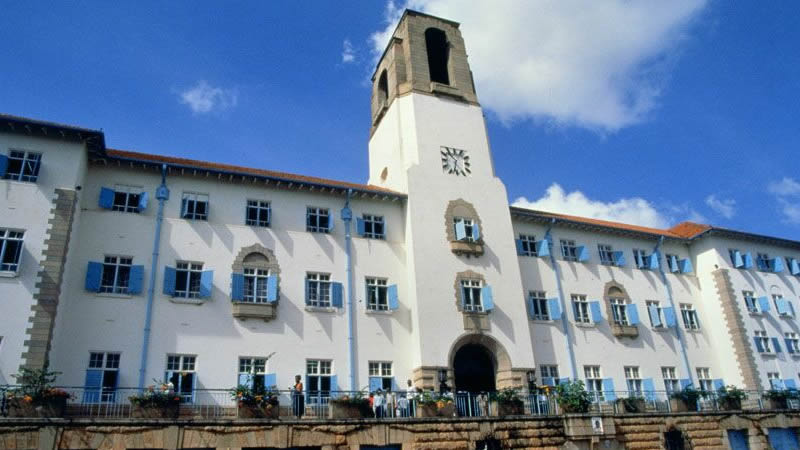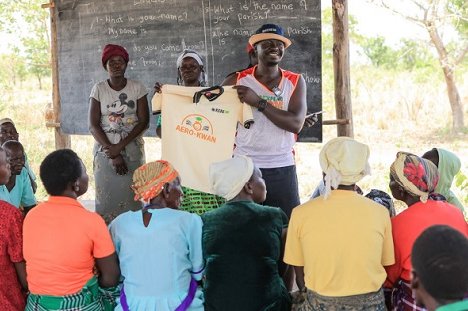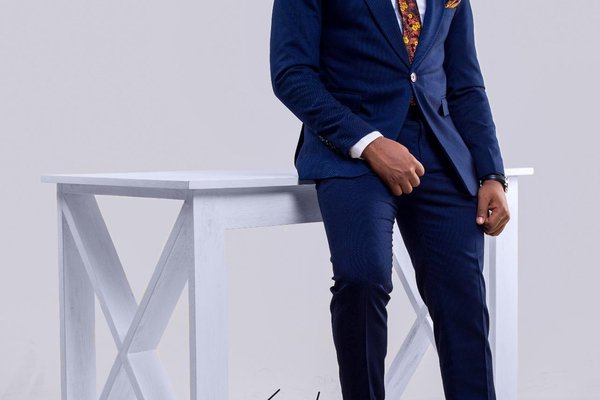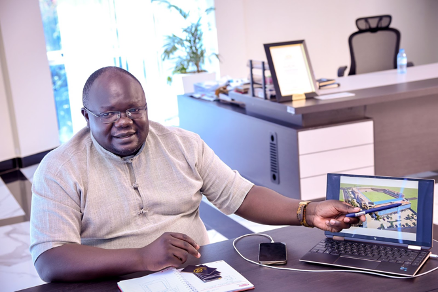By Yusuf Karbani
My story begins in Bushenyi in Western Uganda. I am the fifth child of the eight children my parents raised while setting up and running a successful medium sized business. My father came to Uganda in 1930 when he was only 16 years old and took his first job in Kabale. After a couple of trips to India, he finally established himself as a “Dukawala” in Bushenyi in about 1945. Reflecting on those times, I realise, my dad was a forward-looking entrepreneur who grew his business and encouraged his children to aim higher in achieving one’s potential.
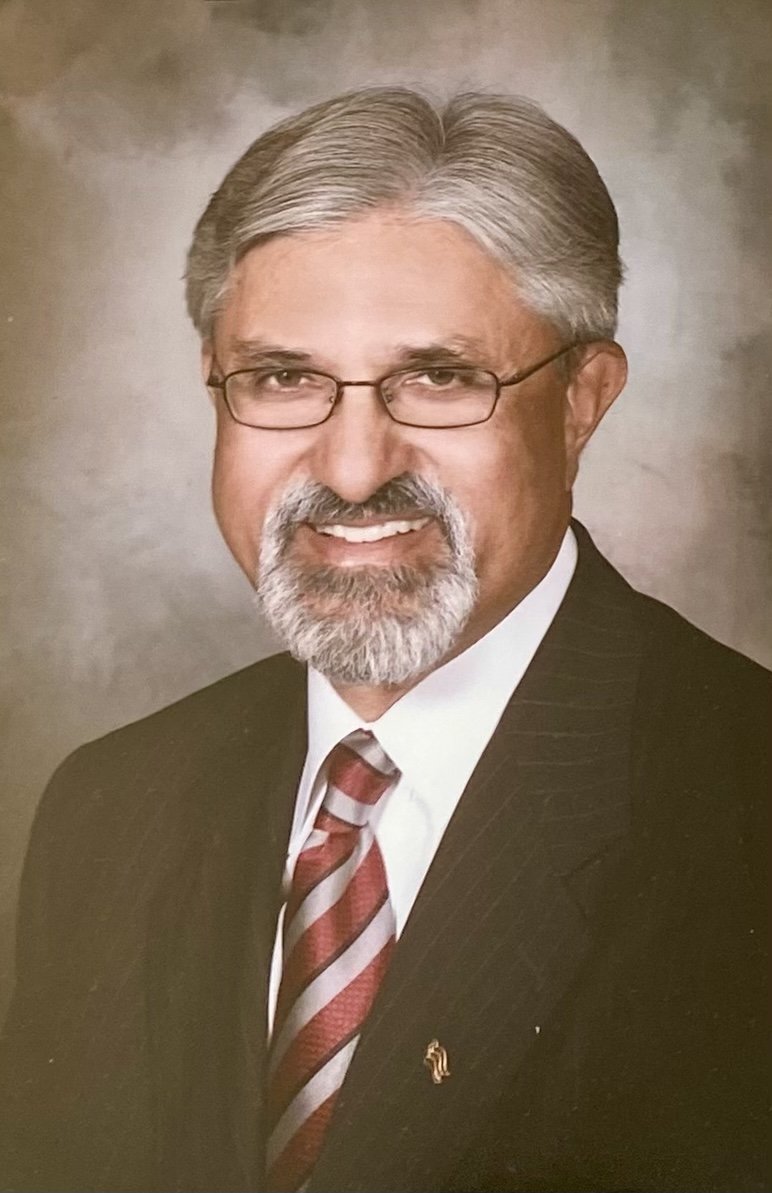
Yusuf Karbani
My early childhood memories are of being surrounded by relatives and friends in a congenial environment. In January 1962 I left to go study at Ntare School which was 37 miles away from my home. I was a day student and I stayed as a paying guest with relatives. Ntare School was a good academic school with a winning record in sports. I was not oriented towards sports, so I concentrated on studies. I was an average student from Senior One to Senior Four and did not have any career counselling nor direction for further studies.
In the year we did the O-Level exams, I felt that my results would not be good enough to get me a slot at Ntare in A-Level, so on a whim, I put my first choice of school on the application form as Aga Khan Secondary School in Kampala.
As I reflect on such moments back then, I am grateful to the “hidden guidance” of the Providence for initiating that inner voice in me to allow me to take the journey I took and to attain a level of satisfaction for all my endeavours.
When the results came out, I had attained 25 points (a score of 24 points would have meant First Grade), which was decent enough to get me into the first choice on my application, the Aga Khan Secondary School. I arrived at the school in early February 1966. The next five years in Kampala (1966 to 1971) would turn out to be some of the most enjoyable of my life.
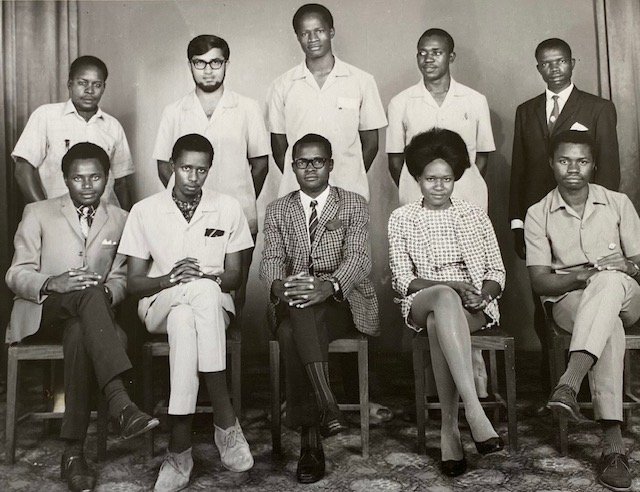
Makerere Student Guild Executive 1969-70
I enrolled for History, Geography and Economic History for my A-Level. I enjoyed studying under Mrs. Rodgers who taught Economic History and Mr Julian Treadaway, a fresh graduate from the UK who taught Geography and got us to take various trips in different parts of the country. All these trips were life enhancing experiences with so many wonderful people and a real “blast” for me.
Back at school, the headmaster appointed me as a prefect which was a pleasant surprise. I enjoyed the role and working with my fellow prefects. In my second year, I enrolled at the Aga Khan Hostel on advice from my friend, Salim Kanji. I also got appointed on the Student Committee at the Hostel that year. Later on in life I would realise that these appointments prepared me for future administrative and leadership roles.
As the time came close to applying to universities for further studies, I was not yet focussed on what I wanted to do and so I thought the best thing to do then was to concentrate on the moment and pass the exams. Luckily, I attained very good results and so Makerere University admitted me with open arms with residence at the Northcote Hall.
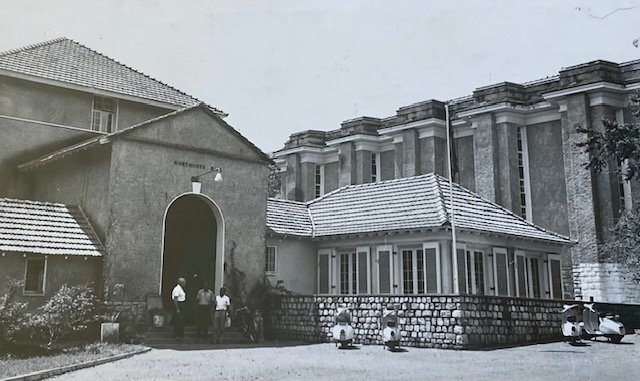
Northcott Hall in 1969
Studying at Makerere University
At Makerere the first-year students took three principal subjects and then concentrated on one subject in the second and third years. This was referred to as 3-1-1 degree and these students would usually go on to have an academic career. The second option was to take two principal subjects in the second and third years, a 3-2-2 degree. I took Political Science, Economics and Religious Studies in the first year. After reflecting on my future prospects of converting my education into practical shillings, I dropped Political Science and Religious Studies, even though my heart was in Political Science with Ali Mazrui as a model I would have wanted to emulate.
As a freshman at Northcote Hall, I run for the position of General Secretary of the Student Council and got elected. One of the highlights of that position included sitting at the high table for dinners. In the second year, I ran for the position of General Secretary for GRC in the Students Guild and got elected. I enjoyed working with the President Peter Anyang Onyong and his team; we had many interesting student/university administration meetings. One of the highlights during this time was a short session with Robert McNamara, the then US Secretary of State.
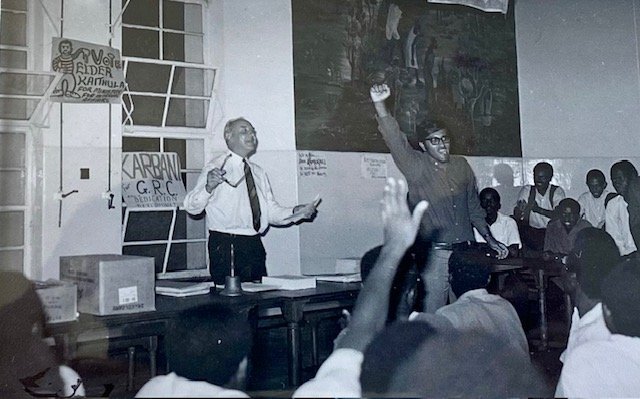
Election for Northcott Executive 1968
Makerere was a very active intellectual centre in Africa and the political and economic and social issues affecting Africa and the world were hotly and softly discussed in various circles, classes, and groups. I was lucky to participate in these discussions at various levels. Some of the discussions centred around economic development and the role of central planning. Foreign aid was also a big discussion item. This was because the aid was favouring central planning. As such, the private enterprise and small businesses like those the middle-class Asians owned were being sidelined in the process. Around this time, academicians and political leaders were lending their support to a brand of socialism. On campus, there were many discussions of “Ujamaa” as advocated for in Tanzania, and Obote’s own brand under the banner “Common Man’s Charter”.
Some political science professors supported the socialist creed, and dialectical materialism with thesis, antithesis and synthesis were being promulgated while other professors taught with as much fervour about the liberalism of John Stuart Mill. There were also radical groups on campus who revered Che Guevara for his romantic socialism and Mao Tse Tung for his practical approach and slogan, “Power lies in the barrel of the gun”.
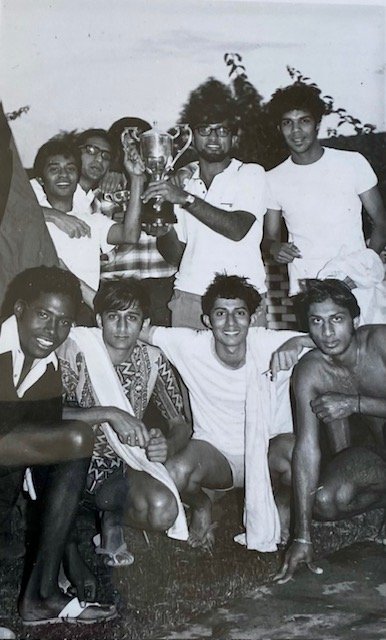
Northcott Swimming Team Win in 1969
Other political topics included the secession of Biafra from Nigeria and there were a number of students from Biafra on campus. Would this lead to Biafranization of Africa, we asked. Some people talked about whether Kabaka Yekka, a party that supported the hereditary ruler of Buganda, could become a national political party or if Buganda would take lessons from Biafra. The same question was being asked about South Sudan and whether it should also secede from Sudan.
The vestiges of the colonial past had not fully departed from Africa and the discussions always centred on the liberation of Southern Africa and the transfer of power to the majority. In this respect, I remember the demonstrations in which I participated, from Makerere campus to the British Embassy to protest against Ian Smith’s Unilateral Declaration of Independence.
The integration of the immigrants and the indigenous population was an apparent issue which was accentuated by economic disparity on a national level. I must point out that while at campus, I never felt any discrimination in any shape or form. I am privileged to have been part of the African history that shaped the events of these years.
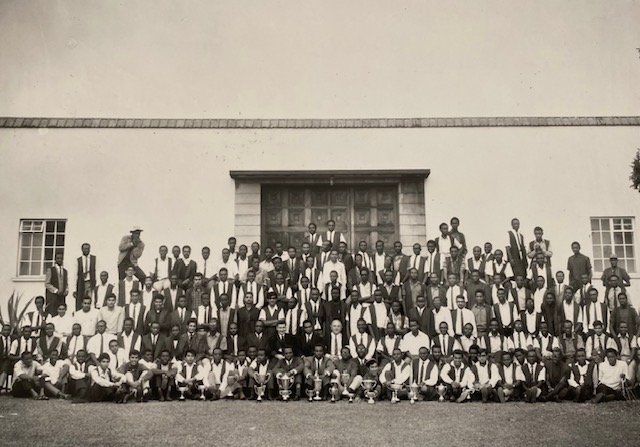
Group Picture of Northcott Hall Residence 1968
Fulfilling leadership roles
Even as I participated in all these debates, I also did various other things. During my second year on campus, I was asked to chair a committee to publish a magazine on behalf of Muslim students on campus. The name of this organization was Muslim Brotherhood of Makerere. We got advertisements from generous businesses in Kampala and with the funds we got, we had the university printers publish the magazine called Ilham. I wish I had kept a copy of the magazine because it had some gems of articles.
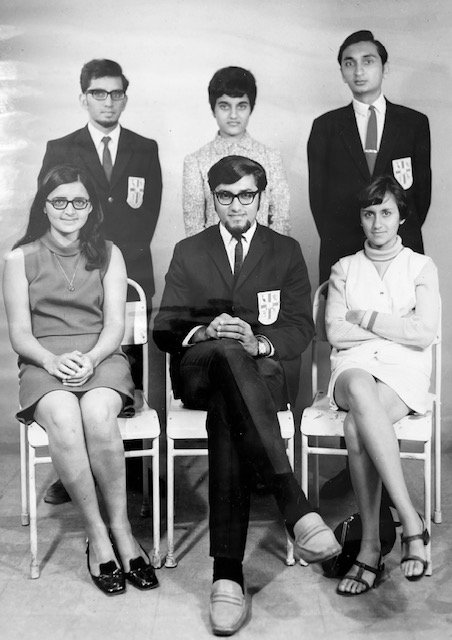
Editorial Committee of Ilham Magazine Published in 1969
My curriculum included a 3-2-2 degree with Economics and Accounting as main subjects in the last two years. My two former classmates from Aga Khan School, Amirali Merali and Almas Kanani also took the same course. I enjoyed all these subjects and fitted my studies with the social and political commitments I had (which were many). Life in Northcote Hall was blissful with so many friends and frequent outings to Indian movies, eateries like Mona Lisa, Azad, and Bat Valley, and to homes of Kampala residents. We also got special treats from the hidden secret of Uganda, Musabhai’s bakery in Nabusanke and made regular visits to Kanubhai’s canteen.
My friends and I were active participants in out-of-town trips organised by various groups while we were at Makerere. Some of the trips we took included the Murchison Falls trip to familiarise ourselves with River Nile crocodiles, and elephants; the Kisumu trip to experience Kisumu hospitality and sumptuous breakfasts; the Masaka trip for the music party and volleyball match; and the Mombasa trip with friends like Tazdin Esmail, Salmin Pradhan and Amir Meghji where the highlight was watching the East African Rally at a checkpoint in Malindi while eating fish pilau.
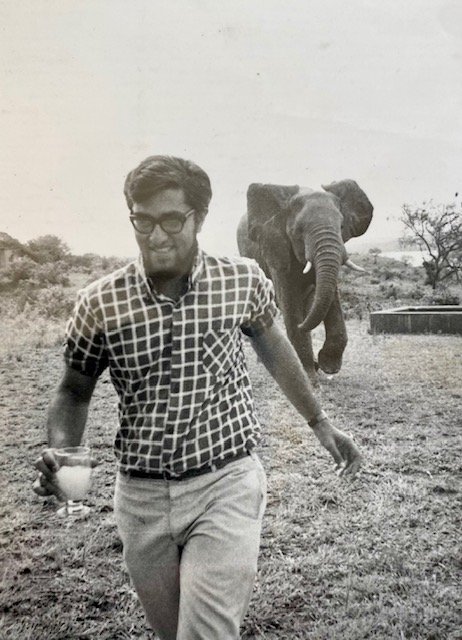
Yusuf Maintaining a safe Distance at Murchison Falls in 1968
Looking back, being in and studying at Makerere was such a dream! It felt like being in heaven without having had to have died to go there. As the time for exams came close, my buddies and I spent more time at the library and in group discussion sessions. There was no way to gauge how well one would fare in such exams, however, I had the most pleasant surprise when the results came out in June 1971 and I had graduated with a First Class Honours.
I started pondering my future and the status of the political atmosphere in Uganda under the newly formed military government. I was advised to enroll in the master’s programme in Economics at Makerere with a part time job as a teaching assistant. I accepted the offer and a month later I got a fortuitous offer from the Department of Social Sciences to study for an MBA at the University of Alberta. This offer was completely unsolicited and took me and my family by surprise. The next few weeks flew by so fast that I just remember being so busy and saying goodbyes to friends and family.
Moving to Canada
On a fine day in August 1971, I arrived at Edmonton, Alberta in Canada with four classmates from Makerere: Moses Kiggundu, Chris Lubwama, Herbert Muyanja and Gabriel Opio. After initial introductions, we were ready to go to classes.
The whole experience for the first few months in Edmonton can be compared to being uprooted from a happy and inviting pot to new soil where it would take time to gain traction. Be it as it may, all we foreign students survived and adapted to favourably competing with our counterparts.
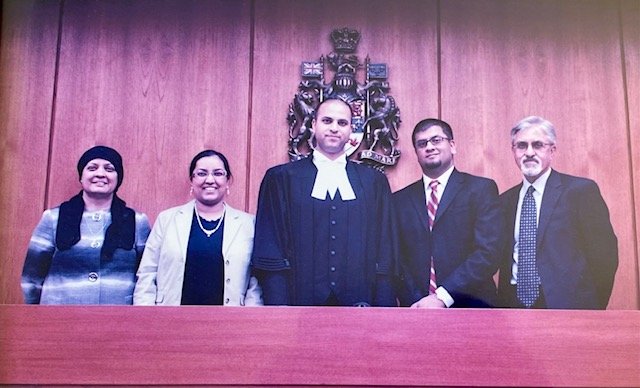
Yusuf Karbani Family in 2009
In May 1973 I graduated from the University of Alberta with an MBA and immediately started looking for a job. After applying for a job with a small accounting firm, I got the offer from a one Ron Galagan. The offer and acceptance of this accounting position was a seminal event in my professional life in Canada. Later the firm was redesigned under the name Gardiner Karbani Audy +Partners. In 1988 I was asked to be the Managing Partner of the firm and I accepted. In 2007 Gardiner Karbani Audy+Partners merged their practice with BDO Canada LLP. During the 1980s my three children were born, and my wife kept the household going while I worked the usual overtime that the partners in public accounting firms do.
My career as an accountant has been very satisfying. I have met wonderful people and had some of the best clients anyone could wish for.
In 2012 I retired from my firm and took on a role as a Broker with RBC Dominion Securities. This entailed taking correspondence courses and taking exams. I was able to complete all required courses to attain a license from the Canadian Securities Institute (CSI) in 2013. I am glad I gained this knowledge, and I am applying it to markets and investments on a daily basis. I decided to work for myself and so I retired from RBC. My wife and I continue to live in Edmonton with our three children and we enjoy it here.
My childhood, education, and career in the countries of Uganda and Canada have taught me so much, and I am grateful for what I have been able to achieve.
Related News
![]() Please join hands with the Makerere University Endowment Fund as it works towards attracting & retaining the best faculty, providing scholarships, and investing in cutting-edge research and technology.
Please join hands with the Makerere University Endowment Fund as it works towards attracting & retaining the best faculty, providing scholarships, and investing in cutting-edge research and technology.
